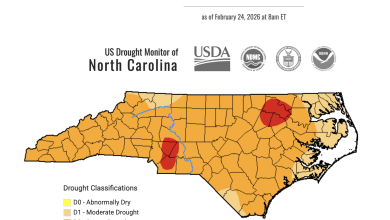
Last Updated on November 16, 2025 10:46 am
RALEIGH — The North Carolina Department of Health and Human Services announced Thursday that oral rabies vaccine distribution over western North Carolina has been postponed to spring 2026.
The bait distribution, originally scheduled to begin in mid-October, was part of an ongoing program to prevent the spread of raccoon rabies west of the Appalachian Mountains.
Wildlife Services had planned to aerially distribute vaccine baits in 16 western counties, including Ashe, Avery, Buncombe, Cherokee, Clay, Graham, Haywood, Henderson, Jackson, Macon, Madison, Mitchell, Swain, Transylvania, Watauga and Yancey. Additional hand distribution was scheduled for the Asheville area.
NCDHHS said it will provide updates as they become available in the coming months.
The oral rabies vaccination program, implemented in the 1990s, helps prevent the raccoon rabies epizootic from moving into areas where raccoon rabies does not exist. The baits contain vaccine packets coated with fishmeal to attract raccoons. When animals bite into the baits, the vaccine activates their immune systems to produce rabies antibodies.
“The best way to prevent rabies is to avoid contact with wild animals and ensure pets are vaccinated against rabies,” said Emily Herring, NCDHHS public health veterinarian. “Through this annual oral rabies vaccine distribution and the vigilance of pet owners, we can work to prevent the spread of this deadly disease.”
In North Carolina, rabies is most commonly found in wild animals. In 2024, over 4,000 animals were submitted to the State Laboratory of Public Health for rabies testing, with approximately 6% testing positive. Raccoons accounted for the highest number of positive tests.
Rabies is almost always fatal in mammals once symptoms develop.
State law requires domestic pets — including dogs, cats and ferrets — to be vaccinated against rabies by four months of age and routinely thereafter.

















